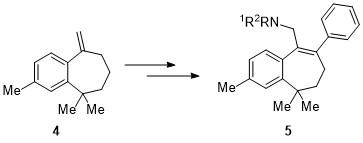Chemistry Research Projects
Current Research
We are developing synthetic methodologies to generally synthesize the class of molecules shown in Scheme 1. These classes of molecules have been identified by computational methods to possibly inhibit non-structural protein 1 of the SARS-CoV-2 virus1.
Scheme 1

While there exists a general method to synthesize the allylic amines (5)2 in Scheme 2 below, an efficient method to synthesize the benzosuberan (4) is not well known.
Scheme 2

Our undergraduate research projects (taken as classes known as Chem 185, 285, and 385) are aimed to develop efficient synthetic methodologies that would then lend themselves to the total synthesis of analogues described in Scheme 1.
Once synthesized, the molecules will undergo biological examinations to test their binding affinities.
1 Singh, R., Bhardwaj, V. K., Das, P., & Purohit, R. (2021). A computational approach for rational discovery of inhibitors for non-structural protein 1 of SARS-COV-2. Computers in Biology and Medicine, 135, 104555
2 Bharti, R., Bal Reddy, C., Kumar, S., & Das, P. (2017). Supported palladium nanoparticle‐catalysed suzuki–miyaura cross‐coupling approach for synthesis of aminoarylbenzosuberene analogues from natural precursor. Applied Organometallic Chemistry, 31 (11)
Past Research
The Los Angeles City College Department of Chemistry has conducted two continuously publishable research projects. The first project dealt with novel antibiotics and antifunguls, while the second project explored hydrogen storage solutions.
The antibiotics and antifunguls were developed in collaboration with UT San Antonio and UCLA where we studied Silver Lipoate Clusters. Our studies are focused on developing synthetic methodologies that enable the self-assembly of the silver clusters. While silver is known for antimicrobial properties, our goals are to bind beta-lactam (penicillin) based molecules that further enhance microbiological activities.

Learn More About the Project Here
View Our Published Work: Activating a Silver Lipoate Nanocluster...
We also worked on Copper Hydride clusters as potential energy storage solutions, in particular hydrogen.
Learn More About the Project Here
View Our Published Work: Aromatic Copper Hydride Cages
Research Opportunity Contact
Generally, students that have completed their chemistry classes at LACC and are enrolled in, or have completed Chemistry 211 at LACC are eligible to apply and participate in our current research projects where you will be engaged in publishable and cutting edge experiences. For more information please contact the Department Chair.